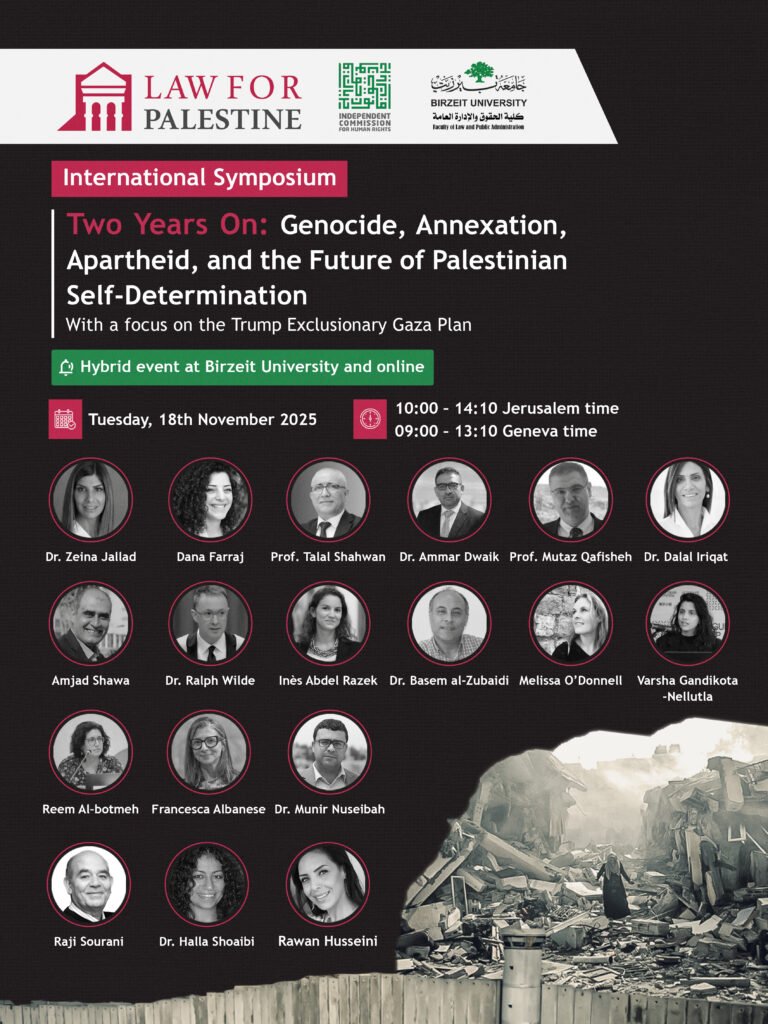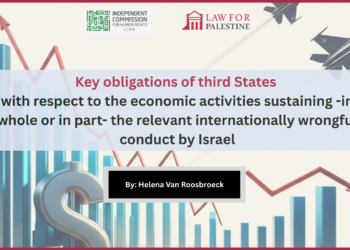International Symposium
Two Years On: Genocide, Annexation, Apartheid, and the Future of Palestinian Self-Determination
With a focus on the Trump Exclusionary Gaza Plan
Hybrid Event
- Date: Tuesday, 18th November 2025
- Time: 10:00 – 14:10 Jerusalem time | 09:00 – 13:10 Geneva time
- Location:
- In person: Hall 243 – Institute of Law Annex Building. Birzeit University (The Faculty of Law and Public Administration).
- Online: Register here to receive the link.
Background
As the world marked two years since the start of Israel’s genocidal war on Gaza, a fragile ceasefire has been reached under the U.S. and regional auspices. The agreement –signed on 13 October by US President Donald Trump, Egypt, Qatar and Turkey in an international summit held in Egypt- was concluded without the presence of either Israel or Hamas, although Palestinian Authority President Mahmoud Abbas was in attendance.
The first phase provides for a cessation of hostilities and the release of all remaining Israeli captives, both alive and deceased, in exchange for about 2,000 Palestinian prisoners and a partial Israeli military withdrawal. Yet, following this initial redeployment, around 58% of Gaza remains under Israeli control, while killings by the Israeli military and obstruction of humanitarian access have continued, with the Rafah crossing still closed.
While UN experts cautiously welcomed parts of the Trump “Peace Plan”, they warned that key elements of the plan are “deeply inconsistent with fundamental rules of international law and the 2024 Advisory Opinion of the International Court of Justice”, which demands Israel’s immediate and unconditional withdrawal from the entire Occupied Palestinian Territory. The experts underscored that any peace initiative must respect international law and the Palestinians’ right to self-determination for it not to create “further conditions of oppression.” Palestinian organisations and Human Rights Watch have emphasised that so-called “peace plans” have historically failed to curb abuses, warning that without structural accountability -including sanctions, arms restrictions, and access to judicial remedies- such initiatives risk perpetuating impunity under the guise of diplomacy.
Meanwhile, systematic violence in the West Bank continues unabated. On 20 August 2025, Israel granted final approval for the long-contested E1 settlement project, a development that would sever the territorial contiguity of the West Bank. This forms part of what the International Crisis Group described in its report, “Sovereignty in All but Name: Israel’s Quickening Annexation of the West Bank”, as Israel’s creeping annexation and the collapse of the two-state paradigm in practice. It consolidates a permanent system of control identified as one of colonial domination and apartheid “on both sides of the Green Line, and throughout the Occupied Palestinian Territory.”
At the international level, alongside the ICJ’s Advisory Opinion on the illegality of Israel’s occupation, the UN General Assembly reaffirmed Israel’s obligation to withdraw and called on all states to refrain from recognising or assisting the illegal situation. Parallel proceedings at the ICJ -including South Africa v. Israel (Genocide Convention) and Nicaragua v. Germany (concerning complicity in genocide)- together with the International Criminal Court’s arrest warrants against senior Israeli leaders, with further warrants expected, have reinforced states’ duties to prevent and punish grave breaches of international law.
At the same time, amid growing global solidarity with Palestine, several states have recognised the State of Palestine. Others -including Spain, Ireland, Norway, and members of the Hague Group– have begun imposing arms embargoes, bans on settlement-related trade, and targeted sanctions in line with their obligations under international law.
The Trump Gaza Plan and the US administration’s proposed UN Security Council resolution appear designed to reverse this emerging accountability framework, normalise the ongoing genocide and illegal occupation, and dilute the Palestinian right to self-determination.
At this critical moment -following the immense suffering and the high cost paid in blood by the Palestinian people- there is an urgent need for Palestinian and international legal voices to come together: to reaffirm the primacy of international law, challenge efforts to normalise illegality, and articulate pathways towards genuine decolonisation and the realisation of the Palestinian people’s right to self-determination. In line with this, Law for Palestine, Birzeit University, and the Independent Commission for Human Rights (ICHR) are organising a hybrid International Symposium to examine key legal and political developments across the occupied Palestinian territory, and to critically assess the recently signed US-backed peace plan and its implications for Palestinian self-determination.
Symposium programme
* Click here for the PDF version

| 10:00 – 10:15 (Jerusalem time) | Organisers’ opening remarks |
| Session One: 10:15 – 11:30
Law and Accountability Under Fire: Genocide, Annexation, and the Trump “Peace Plan” This panel will feature 4 expert speakers, addressing the following themes: 1. Intersecting Regimes of Genocide, Annexation, and Apartheid: Where Do Palestinians Stand Today? 2. Gaza After Genocide: Voices from the Ruins and the Limits of International Protection 3. Annexation, Fragmentation, Apartheid and the Erosion of Palestinian Self-Determination (with a focus on the West Bank, Jerusalem, and 1948) 4. The Trump Exclusionary “Peace Plan” and the Undermining of International Law |
|
| Break (catering provided): 11:30 – 11:45 | |
| Session Two: 11:45 – 13:00
What Comes Next? Decolonisation and the Future of Palestinian Self-Determination This panel will feature 4 expert speakers, addressing the following themes: 1. Reconstruction as Decolonisation: Building a Sovereign and Rights-Based Future for Gaza 2. Diplomacy of Domination: Gaza, Annexation, and the Reconfiguration of the Palestinian Question 3. Accountability for Genocide and Illegal Occupation: The ICJ, ICC, Corporations, and State Obligations 4. Global Solidarity as a Legal and Political Force: Reclaiming International Law for Decolonisation and Justice |
|
| Break: 13:00 – 13:10 | |
| Closing Keynote: 13:10 – 14:00
Reaffirming the primacy of international law: confronting impunity, normalisation, and the struggle for decolonisation |
|
| Recap and closing: 14:00 – 14:10 | |
* Q&A Session: 20 minutes in each session.
Streaming
Organisers will live-stream this event on their YouTube channel and social media platforms. The event will be conducted in English and Arabic, with simultaneous interpretation available.
Register here to attend – click
* For those wishing to attend in person at Birzeit University, registration is not required. You may go directly to the venue at the scheduled time without prior registration
* Live stream here – click





